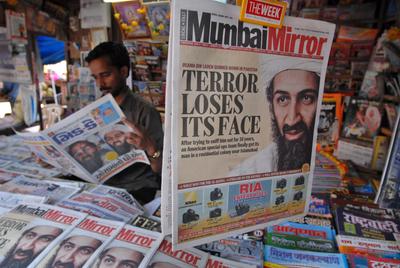Should it emerge that any elements in the Pakistani administration knew of his presence, it will be hard for the US to justify the US$ 3 billion aid package it provides to Pakistan each year, especially when it is bleeding financially itself.
Added to this, the timing of Bin Laden’s killing could give additional credibility to the plan to commence the US drawdown in Afghanistan by this July and complete the process by 2014. Given its massive financial problems, the US badly needs to refocus away from its wars and on to the economy. Ironically, conservatives, so complicit in starting the costly war in Iraq, now want to see the military budget, which will remain tight, refocused on major weapons systems and away from ‘boots on the ground.’ For them, the new challenge is China, not obscure Islamists in far off places.
Given these factors, Bin Laden’s death provides an opportunity to ‘start the beginning of the end’ in Afghanistan.
India is worried. In New Delhi’s view, 2014 is too soon to achieve the desired outcome in Afghanistan — continuation of the Karzai regime or something like it. India’s worst nightmare would be a pan-regional conurbation of Taliban-like forces stretching from Herat to Lahore. Its second worst nightmare would be a reprise of something like the 1996-2001 arrangement, in which the Pakistani military elite was able to rely on a friendly, if Islamist, regime in Kabul.
Having indulged in a little ‘cricket diplomacy,’ India has now greeted Bin Laden’s death with a serve against Pakistan. Home Minister Chidambaram has commented that the fact Bin Laden was located in Abbottabad — tantamount to a garden suburb of Islamabad — for five years means the record of the Pakistani state in knowingly harbouring terrorists continues. New Delhi would like to see the US guiding hand to continue on Pakistan’s shoulder, no matter that Islamabad does not always steer the desired course.
Prior to Bin Laden’s death there had been reports that Pakistan had been attempting to set up an alternative support base to foster its strategic objectives in Afghanistan. According to these reports, Pakistan put to Karzai that Afghanistan, like Pakistan, become more strategically reliant of China. If correct, Islamabad would have been mindful of the impending US drawdown and of the fact that, as in the aftermath of the Soviet withdrawal from Afghanistan, Pakistan would then become strategically irrelevant to the US.
Even if these reports were correct, military-strategic support (as distinct from financial support) from China for Afghanistan was never a realistic proposition. China has been free-riding on the US in the Middle East and South West Asia. It now has massive oil investments in Iraq and significant emerging investments in Afghanistan, including a US$4 billion copper mine. Ever more dependent on Middle East oil and gas, it is all too happy for the US to do the military heavy lifting and financially to eviscerate itself in the process. Nor has it been Beijing’s style to become strategically involved in its many areas of influence.
Reports that Pakistan has attempted to play the China card, if true, would indicate that the Pakistani governing elites are aware that the game is starting to unravel and that the US is preparing to call it a day. If it emerges that elements of official Pakistan have colluded in hiding Bin Laden, that process can only intensify.
Meanwhile, the tensions generated by the Pakistan-US relationship on both sides have become palpable. Hitherto, the two have tried to sweep the uncomfortable elements of the relationship under the carpet, each for its own purposes. The US still needs Pakistan to deal with Taliban safe havens such as North Waziristan and as a vital transit point into Afghanistan. The Pakistani elites are to an extent dependent on the US relationship economically and militarily. The compromise involved has meant that Pakistan has continued to host drones, while at the same time publicly excoriating the US for the loss of civilian life involved. On its part, the US has provided sophisticated equipment — including F16 fighters — to the Pakistani military and supported the stumbling economy.
The immediate questions are: How much life is left in this arrangement? Who will cut and run first? Will Bin Laden’s death provide the trigger?
My guess is that there is still some juice left in this particular lemon, mainly because the alternatives are so bleak for both parties. Perhaps the charade can continue for a year or two at most. But that is not long in strategic terms. The question then will be: what next?
Professor Sandy Gordon is with the Centre of Excellence in Policing and Security (CEPS), in Regnet, at the Australian National University
This post first appeared here at South Asia Masala.

